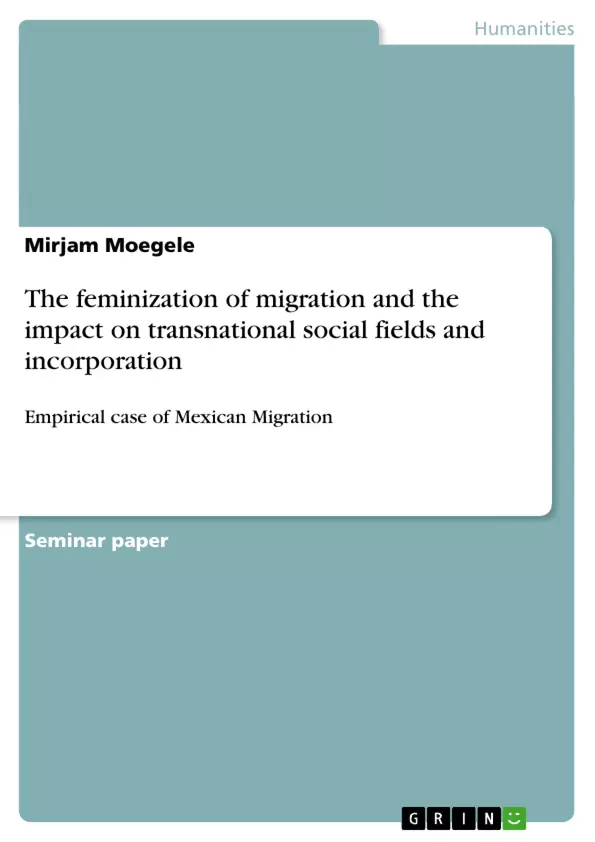Labour migration favours a growing intensity of circulating movements of people, goods, information and symbols across national borders. Positively influenced by new communication technologies, infrastructure and money transfer, national borders are crossed physically and mentally in everyday life by transmigrants. Transnationalism is hence a new form of a bounded-nomadic way of living as it implicates a movement between two fixed localities (Pries 2008). In the case of the Mexican migrants, the recruitment politics of the U.S. of low-skilled and cheap labour launched unintentionally a self-sustaining migration-process between Mexico and U.S., which over the years became more diversified concerning local origins, sex and status of migrants (Massey/Goldring 1994). As transnational fields are multi-layered and multi-sited forms of interaction between individuals, families and nation-states’ practices, we have to rethink boundaries of social life – culturally and geographically (Glick 2001: 1002/3). The creation of a transnational migration networks and the formation of Mexican communities in the U.S. facilitated the situation for future migrants and set the basis for family reunification and chain migration (Massey/Goldring 1994, Espinosa 1997). Speaking of an extension of social life in the process of transnationalization means that kinship and family networks are re-constituted across national borders - simultaneously marked by gendered differences in power and status. Today, we observe the new phenomena of feminization of migration.
Inhaltsverzeichnis (Table of Contents)
- Labour Migration and the Feminization of Migration
- Transnational Fields and Incorporation
- Women’s Motives and Expectations
- Women’s Roles in Settlement
- Transnationalism and Incorporation as Parallel Processes
- Transnational Engagement and Inter-familial Relations
- Women's Mediating Role
Zielsetzung und Themenschwerpunkte (Objectives and Key Themes)
This text explores the feminization of migration and its impact on transnational social fields and incorporation, using the case of Mexican migration. It aims to understand how women's experiences of migration, settlement, and transnational engagement differ from men's, and how these differences affect their integration into both their home and host countries.
- The growing role of women in migration
- The impact of migration on traditional gender roles and family structures
- The influence of transnational social fields on the lives of Mexican migrants
- The role of state institutions in shaping migration patterns and integration
- The negotiation of gender roles within transnational spaces
Zusammenfassung der Kapitel (Chapter Summaries)
The text examines the feminization of migration and its consequences for transnational social fields and the integration of Mexican migrants. It delves into the factors driving women's migration decisions, their roles in settlement, and the ways they navigate transnational ties. The text highlights the distinct motivations and circumstances that influence women's choices to migrate. It then examines the key roles women play in establishing new communities in the host country, noting their strong focus on long-term settlement and their engagement with local institutions. The author explores the relationship between transnationalism and incorporation, arguing that these processes are parallel and simultaneous. The text emphasizes the decreasing influence of home-country ties as communities develop in the host country, but also recognizes the continuing importance of transnational engagement for many migrants. The text further examines the impact of gendered bargaining dynamics within families on transnational activities. It explores how men's experiences of loss of status in the host country can drive their transnational engagement, contrasting this with women's more service-oriented and supporting roles. Finally, the text highlights the crucial role of women in mediating between state institutions, community interests, and family needs. The author argues that the changing circumstances of migration, particularly the increasing participation of women, influence integration and transnational engagement patterns. The text underscores the dynamic nature of gender roles, recognizing how they are continuously negotiated within transnational contexts.
Schlüsselwörter (Keywords)
The main keywords and focus topics of the text include: feminization of migration, transnational social fields, incorporation, Mexican migration, gender roles, family structures, state institutions, transnational engagement, gendered bargaining, and community integration.
Frequently Asked Questions
What is the "feminization of migration"?
It refers to the increasing trend of women migrating independently or as primary breadwinners, rather than just as dependents of male migrants.
What are "transnational social fields"?
These are multi-layered networks of interaction where migrants maintain social, economic, and political ties across national borders simultaneously.
How do gender roles change during migration?
Migration often re-constitutes family networks, leading to a negotiation of power, status, and responsibilities between men and women in the host country.
What is the role of women in the settlement process?
Women often play a mediating role between state institutions, the community, and the family, focusing more on long-term settlement and local integration.
How does transnationalism relate to incorporation?
Transnationalism (maintaining home ties) and incorporation (integrating into the host society) are parallel processes that occur simultaneously for many migrants.
- Quote paper
- Mirjam Moegele (Author), 2009, The feminization of migration and the impact on transnational social fields and incorporation, Munich, GRIN Verlag, https://www.grin.com/document/147112



